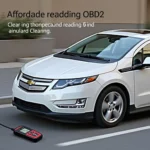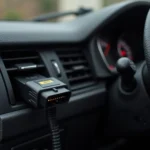Choosing the right OBD2 scanner can be a daunting task, especially when you want one that can handle everything. From basic diagnostics to advanced features, the market is filled with options, leaving you wondering which one truly delivers the best value for your money.
This comprehensive guide will explore the key aspects of choosing the “best” OBD2 scanner that does it all, addressing your specific needs and preferences. We’ll delve into essential features, different types of scanners, and provide recommendations for various users, ensuring you find the perfect OBD2 companion for your automotive journey.
What is an OBD2 Scanner and Why You Need One?
An OBD2 (On-Board Diagnostics 2) scanner is a device that connects to your vehicle’s diagnostic port, enabling you to access and understand critical data about your car’s performance. It acts as a bridge between your vehicle’s onboard computer and you, providing valuable insights into its health and any potential issues.
Here’s why you might need an OBD2 scanner:
- Diagnose and Troubleshoot Problems: If your car’s “Check Engine” light comes on, an OBD2 scanner can help you identify the underlying issue, potentially saving you time and money on unnecessary repairs.
- Monitor Real-Time Data: OBD2 scanners can provide real-time readings on various parameters like engine speed, fuel consumption, and emissions, helping you understand your car’s performance better.
- Clear Diagnostic Trouble Codes (DTCs): Once you’ve identified a problem, you can use an OBD2 scanner to clear the error codes and reset the “Check Engine” light, saving you a trip to the mechanic.
- Improve Fuel Efficiency: By monitoring your car’s performance data, you can make adjustments to your driving habits, optimize fuel consumption, and potentially save money on gas.
- Track Vehicle History: Many OBD2 scanners can store historical data, giving you insights into your car’s past performance and potential maintenance needs.
Essential Features of a Great OBD2 Scanner
Not all OBD2 scanners are created equal. Here are the key features to look for when choosing the best one for your needs:
- Compatibility: Ensure the scanner is compatible with your vehicle’s year, make, and model. Most modern OBD2 scanners are compatible with vehicles manufactured after 1996 in the United States, 2001 in Europe, and 2005 in Asia. However, older vehicles may require a different type of scanner.
- Code Reading and Clearing: This is the core functionality of any OBD2 scanner. Look for a device that can read both generic and manufacturer-specific codes.
- Data Stream Monitoring: The ability to monitor real-time data is invaluable for performance analysis and problem-solving.
- Live Data Graphs: Visualization of data through graphs is essential for understanding trends and identifying potential issues.
- Freeze Frame Data: This feature captures the vehicle’s conditions at the moment a diagnostic trouble code is set, providing crucial information for troubleshooting.
- Enhanced Features: Advanced OBD2 scanners offer features like sensor testing, actuator testing, and ECU programming, which can be highly beneficial for DIY enthusiasts and professional mechanics.
- User Interface: A user-friendly interface is crucial for easy navigation and understanding the data displayed.
Choosing the Best OBD2 Scanner for Your Needs
The best OBD2 scanner for you depends on your specific requirements and budget. Consider these different scenarios:
For the Occasional DIYer
- Requirement: Basic diagnostics, code reading, and clearing for occasional troubleshooting.
- Recommendation: Look for an affordable, basic OBD2 scanner with a user-friendly interface, like the [shortcode-1]obd2-scanner-basic|Basic OBD2 Scanner for Occasional Use|This scanner is perfect for basic diagnostics and code reading. It’s affordable and easy to use, making it ideal for the occasional DIYer. It’s compatible with all vehicles manufactured after 1996 in the US and offers a clear display for easy understanding of codes.[/shortcode-1].
For the Enthusiast
- Requirement: Advanced diagnostics, real-time data monitoring, and live data graphs for performance tuning and analysis.
- Recommendation: Opt for a more advanced OBD2 scanner with features like data logging, sensor testing, and ECU programming, such as the [shortcode-2]obd2-scanner-enthusiast|Advanced OBD2 Scanner for Enthusiasts|This scanner is packed with features for enthusiasts and professionals. It offers data logging, live data graphs, and sensor testing capabilities, making it ideal for performance tuning and advanced diagnostics.[/shortcode-2].
For the Professional Mechanic
- Requirement: Comprehensive diagnostics, advanced features, and compatibility with various vehicle makes and models.
- Recommendation: Choose a professional-grade OBD2 scanner with extensive code libraries, advanced troubleshooting tools, and integration with repair information databases, like the [shortcode-3]obd2-scanner-professional|Professional-Grade OBD2 Scanner for Mechanics|This professional-grade scanner offers comprehensive diagnostics, advanced features, and compatibility with a wide range of vehicles. It’s perfect for experienced mechanics who need access to advanced tools and information.[/shortcode-3].
Finding the Right OBD2 Scanner: A Checklist
To simplify your search for the perfect OBD2 scanner, consider these factors:
- Your Vehicle: Check compatibility with your car’s year, make, and model.
- Your Needs: Identify your key requirements for diagnostics, data monitoring, and other features.
- Your Budget: Set a realistic budget and choose a scanner that offers the best value for your money.
- User Reviews: Read reviews from other users to get insights into the scanner’s performance and user experience.
- Brand Reputation: Choose a reputable brand known for quality and reliability.
FAQs
Q: What is the difference between OBD1 and OBD2 scanners?
A: OBD1 is an older diagnostic system found in vehicles manufactured before 1996. OBD2 is the newer standard implemented after 1996. OBD2 scanners are compatible with both OBD1 and OBD2 systems.
Q: Can I use an OBD2 scanner to clear my “Check Engine” light without visiting a mechanic?
A: Yes, you can use an OBD2 scanner to clear the “Check Engine” light. However, it’s essential to understand the underlying issue and address it appropriately.
Q: Can I use an OBD2 scanner to modify my car’s performance?
A: Some OBD2 scanners offer features like ECU tuning, which can modify your car’s performance. However, it’s crucial to consult a professional before making any modifications.
Q: Can I use an OBD2 scanner to diagnose issues with my car’s air conditioning or radio?
A: OBD2 scanners primarily focus on engine diagnostics. While some advanced scanners may provide limited access to other systems, you’ll need specialized tools for air conditioning or radio repairs.
Q: Are there any free OBD2 scanner apps available?
A: Yes, there are free OBD2 scanner apps available for smartphones. However, these apps may have limited functionality compared to dedicated OBD2 scanners.
Choosing the “Best” OBD2 Scanner: A Final Thought
The “best” OBD2 scanner is the one that best meets your specific needs and budget. Don’t be overwhelmed by the vast selection of scanners available. Use this guide to narrow down your options and make an informed decision. Remember, an OBD2 scanner can empower you to understand your car’s health and potentially save you money on maintenance and repairs.

